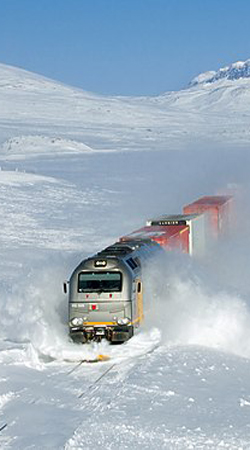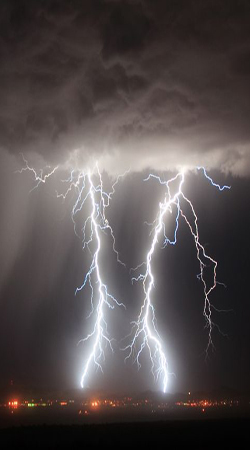

 |
04.18.25- Iran Faces Tough Decisions in Nuclear Negotiations
|
 |
04.17.25- Electricity from rainwater: New method shows promise
When it comes to generating clean energy from water, hydroelectric would certainly be the first thing to come to mind. But the issue with utility-level turbines is that they need large flows of water to operate, so their installation locations are limited. Wave energy is steadily coming on board as well, but again, that type of power generation is very site specific. Read More |
 |
04.16.25- New fuel switches US nuclear reactor from Regular to Premium
Nuclear fuel is one of those things that we tend to pretty much take for granted. You have a nuclear reactor, it needs fuel, you put fuel in. QED. The general assumption is that filling a reactor with uranium and plutonium is like shoveling coal into a boiler furnace – a straightforward operation that, in the case of nuclear, is just a bit more involved. Read More |
 |
04.15.25- Space solar startup preps
The billionaire co-founder of financial services app Robinhood has a new startup called Aetherflux focused purely on beaming solar power from satellites to receivers on Earth. Having announced it last year, Bhatt has now raised US$50 million in Series A funding from a clutch of Silicon Valley investors, and aims to launch a test next year. Read More |
 |
04.14.25- Geothermal Energy Poised for Significant Growth in the US
|
 |
04.12.25- The largest hydroelectric dam in the world has been approved
The project is slated to be built on the Yarlung Zangbo River in Tibet near the border of India at a cost of US$137 billion. It's part of China's 14th "Five-Year Plan," which includes environmental goals to accelerate renewable energy and fight pollution. The location of the proposed dam looks to take advantage of the river's steep geography to harness more hydropower than ever before: 300 billion kilowatt-hours per year. Read More |
 |
04.11.25- Nuclear’s Back—
Therefore, efforts must begin immediately to secure the supply of the key nuclear fuel, the OECD Nuclear Energy Agency (NEA) and the International Atomic Energy Agency (IAEA) said in their Red Book report prepared jointly every two years. Read More |
 |
04.10.25- Oil Prices Drop to Lowest Level Since Pandemic as Trade War Accelerates
At the time of writing, Brent crude was trading at $60.36 per barrel, with West Texas Intermediate at $57.04 per barrel, both down by close to 4% from Tuesday’s close. Since the start of the year, the benchmarks have shed lover $10 per barrel and most analysts expect the rout to deepen as tariffs would sap oil demand. Read More |
 |
04.09.25- Renewable energy now handles 40% of our global electricity needs
The finding comes from data and estimates culled from 215 countries. The 118-page Global Electricity Review 2025 analyzes trends underlying the changes and the likely implications for energy sources and power sector emissions in the near future. Read More |
 |
04.08.25- US Uranium Production Hits Highest Level In 6 Years
|
 |
04.07.25- Demand for Lithium Strains Water Resources
|
 |
04.05.25- U.S. Natural Gas Prices Drop 6% as WTI Oil Craters by Nearly 9%
The benchmark price for U.S. natural gas delivered at Henry Hub was plunging by 6.26% to $3.877 per million British thermal units (MMBtu) as of 10:35 a.m. EDT. At the same time, the WTI Crude futures were tumbling by as much as 8.59% to $61.14. Read More |
 |
04.04.25- Oil Executives Voice Concern Over Trump Energy Policies as Prices Plummet
|
 |
04.03.25- U.S. Uranium Market Goes Radio Silent on Tariff Shock
Bloomberg reported this week that uranium purchases by U.S. power utilities had dropped by 50% ahead of the 10% import tariff that Trump imposed on Canadian energy exports. The publication noted that those power utilities source more than a quarter of their uranium from Canada, which makes the potential impact of the tariffs rather palpable. If the tariffs do come into effect as scheduled and stay in place long enough, U.S. power utilities may have to replace their top source of nuclear fuel if they are to take full advantage of what many have called a nuclear Renaissance.Read More |
 |
04.02.25- Sodium-iron battery startup to challenge Li-ion for extended storage
|
 |
04.01.25- Peak Permian? Geology and Water Say We’re Close
Top executives at major shale firms have already expressed opinions that Permian oil production could hit its peak as early as the end of this decade. Read More |
 |
03.31.25- BP, Shell, and Exxon Signal One Thing: Oil Isn’t Going Anywhere
|
 |
03.29.25- Future of Biofuels Hinges on Industry Agreement
|
 |
03.28.25- Palisades Nuclear Plant Revival Sparks Industry Interest
|
 |
Tiny nuclear battery could power devices for decades
Called a dye-sensitized betavoltaic cell, this battery uses beta particles, which are just high-energy electrons. The magic in this battery is the material carbon-14, a radioactive isotope that emits beta particles. These particles strike a titanium dioxide semiconductor coated with a ruthenium-based dye, which knocks electrons loose in the dye, generating an electrical current. Read More |
 |
03.26.25- And Now, for Something Entirely Different:This looks like a divorce. And it’s going to be a messy one
The administration was discussing if, when, and how to strike against the Houthi rebel group in Yemen, which has been menacing commercial ships in the Red Sea since late 2023. Read More |
 |
03.25.25- AI, Crypto Data Could Soon Use Over 10% of All U.S. Electricity
|
 |
03.24.25- Hedge Funds Struggle as
Bloomberg wrote this week that a lot of money managers were scrambling to strike the right balance between investors who were still insistent that emission-cutting commitments were priority number one and those who are accepting energy reality for what it is and seeking to replace those commitments with profits. Read More |
 |
03.22.25- Big Oil Shrugs at $50 Crude
|
 |
03.21.25- Report Shows Geothermal Can Meet 64% of AI Energy Demand Boom
|
 |
03.20.25- World's first long-life sodium-ion power bank launched
On the outside, the affectionately named DE-C55L-9000 looks similar to the vast majority of power banks on the market, with a rounded brick shape housing its 9,000-mAh battery, a 45-W USB Type-C and an 18-W Type-A port, and charging indicator LEDs. Read More |
 |
03.19.25- Harold Hamm: ‘Drill, Baby, Drill’
American producers, especially those pumping crude outside the Tier 1 inventory in the best Permian locations, would need an oil price of around $80 per barrel to cover the cost of drilling wells. Read More |
 |
03.17.25- Nuclear Fusion Race Intensifies With Chinese Breakthrough
|
 |
03.15.25- Reality Check: Towns And States Don't Want Green Energy
|
 |
03.14.25- Green steel plant glugs out first ton of molten metal
|
 |
03.13.25- EV-Critical Battery Metal Cobalt Soars As Congo's Export Ban Disrupts Supply Chains
New Fastmarkets data shows that a pound of cobalt hydroxide—the main product exported from the DRC, the world's top producer—has surged 84% since the DRC suspended exports last month to counter a market glut that had pressured prices to multi-year lows. Prices reached $10.50 per pound on Tuesday, the highest level since July 2023. The price of cobalt metal has also soared 43% Read More |
 |
03.12.25- Trade Wars Spark Uncertainty
US Energy Secretary Chris Wright announced that he plans to work with the Congress to cancel the mandated sales of 100 million barrels of strategic petroleum reserves in 2026-2031 to refill SPR stock. Read More |
 |
03.11.25- Record Nuclear Power Production
|
 |
03.10.25- Ultra-fast thermal mats could power homes, or radically reduce energy
How does the IsoMat achieve these goals? Essentially by moving heat from one place to another in a radically quick and efficient fashion. Read More |
 |
03.08.25- PA Faces "Looming Power Crisis" After Gov. Shapiro's Electricity Tax
|
 |
03.07.25- Italy Overturns 40-Year Nuclear Ban
|
 |
03.06.25- U.S. Crude Stockpiles Climb as Oil Prices Tumble Below $70
Crude oil prices were down prior to the crude data release by the U.S. Energy Information Administration, even after the American Petroleum Institute (API) reported on Tuesday a dip of 1.455 million barrels in U.S. crude oil inventories. The market-moving force, rather, was OPEC+’s decision to begin unwinding its production cuts starting in April. The Brent benchmarkwas trading down 2.13% at 9:47 a.m. ET at $69.53, marking three days of consecutive losses. The WTI benchmark, meanwhile, was trading down 2.64% at $66.46. Read More |
 |
03.05.25- Solar film you can stick anywhere to generate energy is nearly here
Power Roll has been focusing on embossing 'microgroove structures' into a plastic substrate, similar to a "hologram" on a credit card. A single square meter has 500,000 microgroove structures, and these are coated with conductive materials and photo-active ink. Layers of encapsulation film keep the printed rolls stable and enhance their durability. Read More |
 |
03.04.25- Penn Undergraduate Solves Century-Old Wind Energy Problem
|
 |
03.03.25- Is Trump Breaking the Wind Industry?
On Trump's first day back in office, he took an axe to federal wind policies, pausing leasing and permitting for new projects and leaving developers in limbo. Offshore and onshore wind giants—Shell, TotalEnergies, and Orsted among them, according to the WSJ—are suddenly staring at billion-dollar write-downs and wondering if their investments just got sucked into a policy tornado. Read More |
 |
03.01.25- Fusion Technology to Revolutionize Geothermal Power
|
 |
02.28.25- Helion eyes Washington site for 2028 fusion reactor build
Local media outlet Wenatchee World reported that Helion made an announcement at a press conference on Thursday, laying out its plans to lease a site in Malaga. The prospective project is located within Chelan County, and near the Rock Island Dam on the Columbia river. The land is owned by Chelan County Public Utility District. Read More |
 |
Without the shale revolution, global oil production would likely have peaked in the early 2010s, and current output would be at least 10 million barrels per day lower than it is today. Read More |
 |
02.26.25- Iran Turns to Solar to Address Electricity Shortage
The Middle Eastern country is one of the richest in energy resources, holding the second-largest natural gas reserves behind Russia, at 17 percent, and 9.4 percent of global oil reserves. It is a founding member of OPEC and the Gas Exporting Countries Forum (GECF). Read More |
 |
02.25.25- BYD to build the 'world's largest' battery storage projects
|
 |
02.24.25- Drilling the deepest hole in history: Unlocking geothermal energy
|
 |
02.22.25- AI Data Centers Bet on Next-Gen Nuclear
Many start-ups in the United States and Europe are vying to become the first to not only design but also put into commercial operation the next generation of advanced nuclear reactors. Read More |
 |
02.21.25- Floating nuclear power plants to be mass produced for US coastline |
 |
02.20.25- The Economics of Solar Power
|
 |
02.19.25- France runs fusion reactor for record 22 minutes
|
 |
02.18.25- Coal Consumption Remains High in the United States
|
 |
02.17.25- Trump's Energy Secretary Is Betting Big on Nuclear Power
|
 |
02.15.25- Britain's Energy Future Hinges on Small Modular Reactors
Last month was the hottest January on record globally. It was unexpected because the natural weather phenomena known as ‘La Niña’ should have produced a cooling effect. That suggests that La Niña might be losing its ability to keep global warming in check – a terrifying reminder of the escalating climate crisis. Read More |
 |
02.14.25- What Happened to the
|
 |
02.13.25- America's War On Coal Power-Plants
|
 |
02.12.25- Net Zero Dreams Meet Energy
The surge in energy prices, especially in Europe, has forced governments to address immediate concerns about the cost of living and high energy prices rather than gain more support for net-zero goals and policies. Read More |
 |
02.11.25-International Collaboration Driving Advancements in Geothermal Technology
|
 |
02.10.25- Trump's Energy Policies Cast Shadow Over U.S. Wind Industry
|
 |
02.08.25- Flying figure-eights
In 2023, wind energy accounted for roughly 7.8% of all electricity created around the world. There are a few countries that have really topped the list of wind-energy generation: Fifty-eight percent of Denmark's total electricity generation was wind. Uruguay saw 43%. Ireland 35%. Read More |
 |
02.07.25- Drought Dims Hydropower's Promise
|
 |
02.06.25- The Trump Administration Could Throw A Lifeline To The Uranium Sector
|
 |
02.05.25- China Hits Clean Energy Goal Six Years Ahead of Schedule
China, the world’s biggest emissions polluter, set in 2020 a goal to have at least 1,200 gigawatts (GW) of solar and wind capacity by 2030. Read More |
 |
02.04.25- 28-ton, 1.2-megawatt tidal kite is now exporting power to the grid
Solar energy is the bedrock of most renewable energy grid plans – but lunar energy is even more predictable, and a number of different companies are working to commercialize energy generated from the regular inflows and outflows of the tides. Read More |
 |
02.03.25- Energy and Nuclear Stocks Recover After DeepSeek Selloff
|
 |
01.31.25- Green Hydrogen Hype Fizzles as Implementation Lags
|
 |
01.31.25- The Small Nuclear Reactor Revolution Is Underway
SMRs are advanced nuclear reactors with a power capacity of up to 300 MW(e) per unit, equivalent to about one-third the generating capacity of a conventional nuclear reactor. SMRs are much smaller than traditional reactors and are modular, making it easier to assemble them in factories and transport them to the site. Because of their smaller size, SMRs can be installed on sites that are not suitable for conventional reactors. They are also significantly cheaper and faster to build than traditional nuclear reactors and can be constructed incrementally to meet the growing energy demand of a site. Read More |
 |
01.30.25- Chevron And GE Vernova Teaming Up To Build Nat Gas Plants To Power Data Centers
The latest example? Chevron, Engine No. 1, and GE Vernova are teaming up to build natural gas power plants in the U.S., co-located with data centers to meet growing electricity demands driven by AI development, according to Yahoo Finance. Read More |
 |
01.29.25- Helion has $1 billion and 3 years to figure out fusion-powered energy
Washington-based fusion energy company Helion just raised US$425 million in fresh funding for its bid to be the first to produce usable electricity through nuclear fusion. The firm's latest Series F round brings the total investment into Helion over the $1 billion line, and it's aiming to begin delivering power from a single fusion 50-MW plant to Microsoft by 2028. Read More |
 |
01.28.25- Can Geothermal Become a Major US Energy Source Under Trump?
Yet for various reasons — including logistics, economics, and permitting issues — geothermal has not come close to reaching its potential. That could be changing, with Donald Trump’s surprising embrace of the deep-seated renewable energy source. Read More |
 |
01.27.25- China sets new fusion endurance record of over a thousand seconds
For 80 years, there has been a concerted effort to turn the incredible destructive power of the hydrogen bomb into a practical source of power. In part, this has been a matter of pure science. In part, it's been a major technical challenge. And, in part, it's been a legacy of Cold War rivalries. Read More |
 |
01.25.25- MIT's zero-energy technique shows how to brew ammonia underground
Currently, ammonia is the second-most produced chemical in the world, where about 80% of it is used as agricultural fertilizer. However, current ammonia-production methods chew up about 2% of the world's fossil fuel energy and release about 1% of worldwide manmade greenhouse gas emissions. Put another way, for each ton of ammonia produced, about 2.4 tons of carbon dioxide are released. Read More |
 |
01.24.25- UK Government Pledges Record Investment in Nuclear Fusion
|
 |
01.23.25- World's largest solar energy plant begins to take shape in Abu Dhabi
That's part of a gigascale project set to be built in the capital of the United Arab Emirates by Abu Dhabi Future Energy Company aka Masdar, and Emirates Water and Electricity Company. The firms note it'll be the world's first '24/7' solar photovolatic plant coupled with a Battery Energy Storage System (BESS) to match. Read More |
 |
01.22.25- Permian Basin Oil and Gas Output Faces Disruption Due to Freezing Temperatures
According to the National Weather Service, snow is forecasted to begin in Houston on Monday evening and accumulate to upwards of 4 inches by Tuesday. After the snow, frigid temperatures are expected to sweep in, bringing dangerously cold conditions that could jeopardize the power grid and energy infrastructure. Read More |
 |
01.21.25- Indonesia Bets on Solar Manufacturing Amid US-China Trade Row
China, Cambodia, Malaysia, Thailand, and Vietnam face U.S. tariffs and restrictions in exporting their solar products, including panels and other equipment, as the United States has determined that they have been engaged in dumping practices. Read More |
 |
01.20.25- 3D-printed battery made from fungi feeds on sugars
|
 |
01.18.25- Nuclear Waste: The Dark Side
|
 |
01.17.25- Molten salt nuclear reactor in Wyoming hits key milestone
In Kemmerer, Wyoming, the Naughton Power Plant has been burning coal to provide electricity since the 1960s. But in September 2019, it was announced that the plant would be shut down by 2025 due to issues with operating efficiency and compliance with environmental regulations. Yet unlike other towns where coal plants get shuttered, Kemmerer won't simply fade from the map. Instead, it is the site where Natrium, America's first coal-to-nuclear project, is taking place. Read More |
 |
01.16.25- A Coordinated Strategy To Bring American Energy Dominance Back Again!
One area where Trump made significant headway in his first term was in making America energy independent. Indeed, Trump’s policies began a domestic energy renaissance, making the U.S. energy dominant, becoming a net exporting country for the first time in 75 years. Read More |
 |
01.15.25- 2024 Registrations Of New Electric Cars Plummet 27.5% In Germany…”Petrol Dominates”
Firstly, Germany has been in recession for almost 2 years now – thanks mostly to the policies of Economics Minster Robert Habeck (Green Party), who incidentally has no education in economics, business or finance. The guy just doesn’t know what he’s doing. Read More |
 |
01.14.25- Trudeau's Exit Sparks Oil Industry Optimism in Canada
|
 |
01.13.25- US Oil Growth Slows as
There have already been signs that the oil and gas industry itself is not really on board with a rerun of the “Drill, baby, drill” movie that the shale revolution made. The industry seems to have advanced to the stage of financial discipline and shareholder returns and is not going back to the stage where the ultimate goal was to see just how much oil and gas they could get out of the ground. Then there are the oil and gas themselves. Read More |
 |
01.11.25- Can the World Break Its Reliance on Chinese Clean Energy Tech?
|
 |
01.10.25- Is U.S. Nuclear Power at Risk? Russia's Uranium Restrictions Explained
This graphic, via Visual Capitalist's Bruno Venditti, illustrates the top sources of enriched uranium for U.S. civilian nuclear power reactors in 2023, based on data from the U.S. Energy Information Administration. Read More |
 |
01.09.25- Get Ready for a Major Solar Showdown
|
 |
01.08.25- NYC is set to get a $3 billion,
|
 |
01.07.25- Nuclear Renaissance
|
 |
01.06.25- Could Texas Become a Geothermal Energy Hub?
|
 |
01.04.25- The largest hydroelectric dam in the world has been approved
The project is slated to be built on the Yarlung Zangbo River in Tibet near the border of India at a cost of US$137 billion. It's part of China's 14th "Five-Year Plan," which includes environmental goals to accelerate renewable energy and fight pollution. The location of the proposed dam looks to take advantage of the river's steep geography to harness more hydropower than ever before: 300 billion kilowatt-hours per year. Read More |
 |
01.03.25- Make Lithium Great Again: Peer-Reviewed Study Reveals Whole-Body Benefits Of Supplementation
|
 |
01.02.24- The Factors That Will Drive Oil Prices in 2025
Brent crude and West Texas Intermediate appear set to end the year at nearly the same levels that they started. WTI started 2024 at a little over $70 per barrel and is about to end a little below that. Brent crude looks like it will post a little more noticeable loss, starting the year at $77 per barrel and ending at a bit over $74 time of writing. Read More |
 |
01.01.25- Residential Battery Energy Storage Systems Industry Growth Opportunities - Distributed Solar, Battery Cost Declines, Incentives, and Supportive Regulations Sustain Double-Digit Growth
Dublin, Dec. 13, 2024 (GLOBE NEWSWIRE) -- The "Growth Opportunities in the Residential Battery Energy Storage Systems Industry" report has been added to ResearchAndMarkets.com's offering. Read More |
 |
12.31.24- U.S. Natural Gas Futures Soar Ahead of Historic Cold Front
|
 |
12.30.24- 3 Clean Energy Stocks That Could Thrive Under Trump
|
 |
12.28.24- World's first 30MW pure hydrogen electrical generator
The Jupiter One is the most powerful and largest pure hydrogen generator on the planet. It was developed in collaboration with Mingyang Smart Energy, known for colossal wind turbines, and Mingyang Hydrogen Energy along with several research teams and smaller enterprises. Read More |
 |
12.27.24- Oil Market 2024 in Review: A Year of Surprises and Shifting Demand
|
 |
12.26.24- Geothermal Energy: Big Tech's Answer to AI's Growing Energy Consumption
|
 |
12.25.24- Hydrogen Fuel Cells: A Promising Green Alternative to Battery Electric Vehicles
|
 |
12.24.24- Green Hydrogen Costs Set to Stay Too High For Too Long
BNEF’s new report on hydrogen prices finds that green hydrogen, the one produced via electrolysis using renewable energy, will fail to reach price parity with gray hydrogen by the middle of the century, as costs have more than tripled from last year’s forecast. Read More |
 |
12.23.24- Virginia's fusion power plant: A step toward infinite energy
After over 100 locations around the world were scouted, CFS chose a 100-acre (40.5-ha) plot of land in Chesterfield County in Virginia for the ARC – an acronym for "Affordable, Robust, Compact" – to be built. This fusion power plant aims to produce a continuous 400 megawatts of clean, virtually limitless energy by the early 2030s. Read More |
 |
12.21.24- Tanker Ships Set Sail for Greener Future with Wind-Powered Technology
That's because the Sohar Max, a 400,000-deadweight-ton vessel, was just retrofitted with five 35-meter rotor sails at China's COSCO Zhoushan shipyard, according to Bloomberg. The purpose is to reduce fuel use by 6% and cut annual carbon emissions by 3,000 tons. Read More |
 |
12.20.24- This Major Perovskite Breakthrough Could Change Solar
|
 |
12.19.24- Can Coal Ash Solve the Rare Earth Supply Chain Crisis?
|
 |
12.18.24- AI and Chip Manufacturing Drive Japan's Nuclear Energy Expansion
Japan's long-delayed restart of the 820 MW No. 2 reactor at the Shimane plant, shut down since January 2012, raises the number of operational reactors to 14, with a total capacity of 13,253 MW, according to Reuters. Read More |
 |
12.17.24- New retrofit lets micro-turbines burn both hydrogen and natural gas
|
 |
12.16.24- Enhanced Geothermal: A Game Changer for Renewable Energy
The beauty of this technology, which extracts thermal energy from deep beneath the surface, is that it is widely applicable, and may be of particular interest in regions where they face limitations. Read More |
 |
12.14.24- Uranium Wars
Enriched uranium is used to fuel nuclear reactors. The degree of enrichment is not high. Natural uranium (sometimes called yellowcake) has about 0.7% U-235 isotope. This is enriched to 3% to 5% for use in most reactors (called low-enriched uranium or LEU). Some specialized reactors require uranium enriched to 20% U-235 isotope, but those are rare. Read More |
 |
12.13.24- Collapse of the $5 Trillion
However, even with that astronomical financial support, the world still depends on hydrocarbons for 84% of its energy needs—down only 2% since governments started binge spending on renewables 20 years ago. What is really going on here? Read More |
 |
12.12.24- China Looks To Build The Largest Human-Made Object in Space
The startup notes that space solar power can revolutionize energy distribution, especially where delivering power is expensive, challenging, or dangerous. Powering hard-to-reach places like remote military bases, islands, or areas hit by disasters unlocks new capabilities and advantages for our country. Read More |
 |
12.11.24- Nuclear Stocks Were Super Hot Just A Month Ago. What’s Changed?
|
 |
12.10.24- Emerging Trends from Electrification to Energy Management
Society is undergoing a scientific renaissance driven by the timely convergence of technological advancements and investments in energy. Read More |
 |
12.09.24- AI's Energy Appetite Sparks Global Power Grid Concerns
|
 |
12.07.24- Solar Panel Importers Face
Companies have until December 3rd to install the panels, and U.S. Customs and Border Protection has pledged strict enforcement to prevent stockpiling, potentially exposing importers to audits, inspections, and billions in backdated tariff costs. Read More |
 |
12.06.24- Small Nuclear Reactors Are Gaining Traction Around the Globe
|
 |
12.05.24- Texas Looks to Capitalize on Big Tech’s Nuclear Power Push
These mines are the leading edge of what government and industry leaders in Texas hope will be a nuclear renaissance, as America's latent nuclear sector begins to stir again. Read More |
 |
12.04.24- Why No One Wants California’s Orphaned Oil Wells
Last year, California sought to prevent a rise in the already high number of so-called orphan oil wells. The state also looked to keep from passing off to taxpayers the liability for plugging and abandoning oil wells should operators not have sufficient funds to plug and decommission non-producing wells and clean up the sites. Read More |
 |
12.03.24- The Next Four Years Will BeAll
|
 |
12.02.24- Why Europe’s Hydrogen Economy Dreams Remain Just That
|
 |
11.30.24- The Secret Metal That Helped Win WWII is Back, And Prices Are Soaring
A German U-boat lurking in the cold Atlantic waters fired a torpedo and the ship went down, sinking to the ocean floor along with its mysterious cargo. Read More |
 |
11.29.24- American Oil Rigs Continue Their Steady Decline
The total rig count fell by a single rig for the third week in a row, landing at 582 total rigs, according to Baker Hughes, 43 years fewer than a year ago. Read More |
 |
"Competitive markets — not the dictates of far-flung asset managers — should determine the price Americans pay for electricity," wrote Texas Attorney General Ken Paxton in the complaint. Read More |
 |
11.27.24- Trump's Nightmare: The Critical Resource Biden Couldn't Secure
The metal is not gold, silver, or uranium. It’s not the lithium used for EV batteries. It’s not the copper that is essential for electrification. It’s not even the rare earth elements that are crucial for everything from smartphones to wind turbines. Read More |
 |
11.26.24- Fast-charging lithium-sulfur battery for eVTOLs nears production |
 |
11.25.24- Government Funding Fuels
|
 |
11.23.24- Sodium-Ion Batteries: A Promising Rival to Lithium?
|
 |
11.22.24- China's Solar Dominance Fuels Asia's Green Energy Shift
Southeast Asia’s demand for renewable energy is rising, driven by tech manufacturing and data center growth, according to Nikkei. Solarvest, the region's leading renewable energy provider, plans to capitalize on this boom by increasing imports from China, according to a local manager. Read More |
 |
11.21.24- Small modular nuclear reactors get a reality check in new report Small modular nuclear reactors (SMR) are generally defined as nuclear plants that have capacity that tops out at about 300 megawatts, enough to run about 30,000 US homes. According to the Institute for Energy Economics and Financial Analysis (IEEFA), which prepared the report, there are about 80 SMR concepts currently in various stages of development around the world. Read More |
 |
11.20.24- Why Big Oil Is Scaling Back Renewables Investment
First came the ambitions to become major players in the renewables sector and goals to reduce oil and gas production by the end of the decade. That was in 2019 and early 2020 when Big Oil firms were racing to announce major shifts in strategy toward conventional and green energy. Read More |
 |
11.19.24- First onshore wave energy project in the US gets official nod
The idea behind the setup is to mount a number of floaters on coastal infrastructure, which rise and fall to the motion of waves. This drives hydraulic pistons to move fluid to an accumulator, which is then released to produce electricity via a generator. Read More |
 |
11.18.24- Bourbon distilleries: A new source of renewable energy
At the end of the bourbon distilling process, producers are left with a substance known as stillage. This material consists of the grains used to feed the yeast that created the bourbon as well as dead yeast cells and other fermentation products. It is a high protein material and is most commonly used to feed cattle and other livestock. In Kentucky alone, 127.2 million gallons of bourbon were produced when the last comprehensive count was done in 2020 and for each gallon of spirits made, there is 10 times as much stillage produced. Read More |
 |
11.16.24- Shale Industry Wants Liberty CEO Wright as U.S. Energy Secretary
Wright, who advocates for “better human lives by expanding access to abundant, affordable, and reliable energy,” does not have political experience, but is being endorsed by his peer executives to be the next U.S. Secretary of Energy. Read More |
 |
11.15.24- Electrochemical reactor grabs 97.5% of lithium from geothermal sources
It's hard to pick up any rechargeable device these days that doesn't have a lithium-ion battery inside. While there have been alternatives floated, such as those based on potassium or sodium, lithium is currently where it's at in the contemporary battery market. That's primarily because, despite occasionally bursting into flames, Li-ion batteries have an excellent energy density that lets them hold a lot of charge in a relatively small size. Read More |
 |
11.14.24- Three Key Energy Moves Trump Plans for His First 100 Days
|
 |
11.13.24- The Future of Nuclear Power is Wrought with Challenges
As I analyze the situation, however, the problems associated with nuclear electricity generation are more complex and immediate than most people perceive. My analysis shows that the world is already dealing with “not enough uranium from mines to go around.” In particular, US production of uranium “peaked”about 1980. Read More |
 |
The End of Globalism: Navigating the Transition to a Sustainable World
Latour made the case that Trump's perplexing popularity could be traced to his ability to give voice to the anger and fear generated by the effects of Globalism. In fact, Latour noticed that the anger and fear were actually widespread and reflected in Great Britain's exit from European Union and the many right-wing movements in European countries that now are all too familiar eight years later. Read More |
 |
11.11.24- Here's Why These Geopolitical And Financial Chokepoints Need Your Attention...
|
 |
11.09.24- Three Mile Island's Clean Energy Comeback Fueled by Tech Giant Demand
|
 |
11.08.24- And Now, for Someting Entirely Different: Ivy Day Thoughts
|
 |
11.07.24- Solar And Wind Won't Replace Natural Gas For Decades: They Will Depend On It
Today, solar and wind are relatively low cost, and prices will likely fall further. But they are not like fossil fuels—they are what’s known as variable renewable energy (VRE)—meaning they only produce electricity when the sun shines or the wind blows. Read More |
 |
Republicans have taken back control of the Senate, while Trump is due to return to the White House after winning the crucial battleground of Pennsylvania. Trump declared victory in a speech in Florida after having earlier won the key swing states of North Carolina and Georgia. The win was officially called by media outlets later in the morning. Read More |
 |
11.05.24- Looming Oil Glut to Reshape Global Energy Landscape
"Next year, the global oil supply is expected to exceed demand by an average of 1.2 million barrels per day," World Bank stated in its latest Commodity Markets Outlook report. The scale of this oversupply is difficult to overstate; these numbers have only been exceeded twice in history, in 1998 and 2020. As a result, a barrel of oil could cost less than $60 within the next six years. Read More |
 |
11.04.24- China sets launch date for world’s first thorium molten salt nuclear power station
|
 |
11.02.24- USGS Finds Enough Lithium to Meet Annual Demand Nine Times Over
|
 |
11.01.24- New Survey Shows Grim Outlook For Oil Markets
|
 |
10.31.24- The Race for Nuclear Fusion
|
 |
10.30.24- Small Nuclear Reactors to Power Czech Republic's Green Energy Shift
The Derby-headquartered giant has handed a 20 per cent share in Rolls-Royce SMR in a deal worth hundreds of millions of pounds. CEZ plans to build the first small modular reactor at the existing Temelin nuclear plant in the first half of the 2030s. Read More |
 |
10.29.24- It's not a tiny home. It's actually a nuclear microreactor powerplant
With backing from Sam Altman, the CEO of OpenAI and makers of ChatGPT, Oklo Inc. – a company that recycles nuclear fuel and uses it in its nuclear fission microreactor dubbed Aurora – says this will be possible. Not only possible, but in Oklo's plans. Read More |
 |
10.28.24- The Green New Scam Is Dying
Whether this preference is based on ignorance of the science, ideological zeal, a willful desire to hurt American growth or simple greed because of their investments in Green New Scam infrastructure varies case by case. Read More |
 |
10.26.24- Big Tech's Nuclear Gamble Could Change The Course of the Energy Transition
|
 |
10.25.24- Oxford Claims to Have Produced Mater-Antimatter Plasma
|
 |
10.24.24- Planet's largest wind turbine record broken again at 26-MW
The nacelle hub height sits at 607 ft (185 m), while the blade diameter is a whopping 1,107 ft (310 m). It has a blade swept area of 812,424 square feet (75,477 sq m). Do you know what else has about that much wingspan? Twelve Boeing 747s. You'd need an area the size of 14 NFL football fields, or a decent city block, to lay it down. It's a bit big. Read More |
 |
10.23.24- Why Is Smart Money Betting Against Renewable Energy
|
 |
10.22.24- Wave-resistant PV platform explores offshore solar potential
|
 |
10.21.24- Scientists To Drill Volcano In Search Of Unlimited Super-Hot Energy
Apart from gaining better insights into the processes taking place under the surface of the Earth, the researchers plan, via a testbed under the Krafla volcano, to look into the potential of super-hot geothermal energy. Read More |
 |
10.19.24- Controversial Study Claims LNG is Dirtier Than Coal
Howarth’s peer-reviewed paper, published in Energy Science and Engineering, claims that LNG has a 33% larger emissions footprint than coal over a 20-year period, challenging the oil and gas industry’s assertion that LNG is a cleaner alternative. Read More |
 |
10.18.24- Ultra-deep fracking for limitless geothermal power is possible: EPFL
|
 |
Google goes nuclear in world-first small reactor agreement
In terms of developing cleaner, carbon-free energy, Google is certainly putting its money where its mouth is. Just last year the company switched on an advanced geothermal plant in Nevada that has already made impressive gains in developing its technology for using heat from beneath the Earth's surface to generate power. Read More |
 |
|
 |
10.15.24- Billionaire Robinhood Co-Founder Eyes Solar from Space
|
 |
|
 |
10.11.24- Solar power project hits the rails with between-track panel pilot
Despite many household and business rooftops rocking solar panels, and dedicated "farms" also soaking up the Sun's energy, there's still huge potential for harvesting much more. Read More |
 |
10.10.24- Declining North Sea Oil Patch Could Make Way For Geothermal Boom
|
 |
10.09.24- Nuclear Power Likely To Grow By Getting Smaller
For many in the nuclear power industry, one way to address these issues is to become smaller. Read More |
 |
10.08.24- And Now, for Something Entirely Different: Traitors to America Should be
|
 |
10.07.24- Is Nuclear Power the Future of Green Energy for Big Tech?
|
 |
10.05.24- Will EU's EV Tariffs Ignite a Global Trade War?
The European Commission, the bloc's executive arm, recently concluded its anti-subsidy investigation into Chinese imports of battery electric vehicles. The findings supported the Commission's move to implement the duties, which would last for five years. Read More |
 |
10.04.24- Oil Stocks To Watch As Middle East Conflict Intensifies
|
 |
10.03.24- Robots are Making Nuclear Energy Safer and More Efficient
|
 |
10.02.24- U.S. Port Strike Could Trigger New Wave of Inflation
|
 |
10.01.24- 3 Stocks To Play The Nuclear Renaissance
|
 |
09.30.24- eVinci nuclear microreactor moves towards commercialization
In the wake of climate change concerns, nuclear energy is experiencing a resurgence. With its zero-emissions principle and ability to generate large amounts of power, it can address many of the challenges facing the energy sector. However, the nuclear industry must overcome issues related to safety (perceived or otherwise), availability, and cost, while also significantly speeding up the construction process, which traditionally takes years. Read More |
 |
09.28.24- An Electric Investment!
Among the forests, fields, farms, housing and office park developments, I see many solar panel arrays. But there’s something else as well, and a lot of it. I’m talking about data centers. They’re especially common in northern Virginia, outside D.C. Northern Virginia is home to 70% of the world’s data centers. Read More |
 |
09.27.24- How China Could Win The Nuclear Fusion Race
|
 |
09.26.24- Thermoelectric generator pulls energy from room temperature heat
Thermoelectric devices are designed to tap into a simple law of physics: heat energy moves from hotter regions to colder ones. In these devices, electrons move from the warmer surface to the cooler one, which produces an electric current. In theory, thermoelectric generators, materials and paints could produce electricitytemperature differences in engines, power plants, even body heat. Read More |
 |
09.25.24- Coal's Resurgence Challenges Global Energy Transition
In this graphic, Visual Capitalist's Bruno Venditti shows global coal consumption by region from 1965 to 2023, based on data from the Energy Institute. Read More |
 |
09.24.24- Three Mile Island Nuke to Reopen with Microsoft Contract
|
 |
09.23.24- U.S. Solar Energy Soars Despite Chinese Competition
|
 |
09.21.24- Gazprom Accelerates Pipeline Gas Transports To China
|
 |
09.20.24- Glowing crystal-powered nuclear battery boasts 8,000x efficiency boost
|
 |
09.19.24- Oil Net Short For First Time in History
|
 |
09.18.24- Sunlight turns CO2 and methane into valuable gases for fuel and industry
Researchers from McGill University have developed a novel process known as photo-driven oxygen-atom-grafting, which uses gold, palladium and gallium nitride as a catalyst to chemically transform carbon dioxide and methane into carbon monoxide and green methanol when exposed to sunlight. Read More |
 |
09.17.24- Solar Pumps Poised to Revolutionize Global Water Access
|
 |
09.16.24- New grid battery packs record energy density into a shipping container
|
 |
09.14.24- Next-Gen Nuclear Power: Oracle's Solution for Energy-Hungry AI
During an earnings call, Ellison said the company is designing a data center that will need over a gigawatt of electricity, which would be supplied by three small nuclear reactors, according to CNBC. Read More |
 |
09.13.24- Russia's Nuclear Ambitions in Central Asia
|
 |
09.12.24- California Launches America’s First Hydrogen-Powered Passenger Train
Dubbed Zemu for Zero-Emission Multiple Unit, the $20 million train uses a hybrid hydrogen fuel cell and battery system to power the lightweight vehicle capable of ferrying 108-seated passengers on a 9-mile line known as the Arrow Corridor. San Bernardino is notorious for its poor air quality thanks to a high concentration of freeways, rail yards and industrial facilities. Read More |
 |
09.11.24- Watch: Giant multibody wave energy converter flaps its way toward launch
Developed by the University of Western Australia's Marine Energy Research Australia knowledge hub, the device is called the Moored MultiMode Multibody (M4) Wave Energy Demonstration Project. Read More |
 |
09.10.24- And Now, for Something Entirely Different: The Mediocrity Downspiral
How do whole agencies, companies, and cultures that were once high function succumb to mediocrity and then collapse into incompetence and nepotism? It seems like poison or like plan, but mostly, i suspect it’s not. it’s just self-assembling self-disassembly. Read More |
 |
09.09.24- Motionless turbines deliver super-efficient wind energy to BMW's factory
|
 |
09.07.24- Why Has the Green Hydrogen Hype Faded?
|
 |
09.06.24- Groundbreaking Study Confirms Human Emissions Have ‘Zero Impact’ on Climate Change
A groundbreaking new study challenges the belief that human emissions are the primary driver of increasing atmospheric carbon dioxide (CO2) concentrations. The research, published in the Science of Climate Change, concludes that sea surface temperatures (SST) play a far more significant role than anthropogenic (human-caused) factors in determining annual changes in atmospheric CO2 levels. Read More |
 |
09.05.24- Global Solar Generation Overtakes Wind Power
|
 |
09.04.24- World's first zinc-ion battery megafactory opens for business
Dubbed the Enerpoly Production Innovation Center, the 70,000-sq-ft (6,500-sq-m) factory is designed to achieve a capacity throughput of 100 MWh annually. That’ll be in a couple of years though: while the company has begun commissioning already, it’s slated to reach full production capacity only in 2026. Read More |
 |
09.03.24- Nuclear Fusion, a Perpetually Distant Dream, Moves Closer to Reality
|
 |
09.02.24- Energy Majors Say Oil is Here to Stay
|
 |
08.31.24- Hydrogen stored in iron: A cheap, scalable grid battery for the winter
|
 |
08.30.24- H2Starfire engine: A new and insanely efficient type of rotary
With internal combustion engines (ICE) on the way out and electric vehicles (EV) on the way in – both politically and environmentally – innovative ways of using renewable energy for clean transportation are at the forefront of many engineering minds. Read More |
 |
08.29.24- World's first green ammonia plant is now open for business
The plant is said to be capable of producing 5,000 tons of green ammonia per year, entirely from solar and wind energy. Topsoe reports that this effort will prevent 8,200 tons of carbon dioxide emissions annually. Read More |
 |
08.28.24- Nuclear reactors a mile underground promise safe, cheap power
With its promise of limitless energy by breaking down matter itself, nuclear power has long held a utopian promise for humanity. However, economic and safety considerations, along with political opposition, have hindered its development – especially in the very countries that developed the technology. Read More |
 |
08.27.24- Oil Prices Soar as Geopolitical Risk Rises Rapidly
While hopes of an interest rate cut had already boosted bullish sentiment in markets, it is geopolitics and supply risks that sent prices soaring on Monday morning. A combination of Israel launching strikes against Hezbollah in Lebanon, Russia launching a major missile and drone attack on Ukraine, and the Libyan government in Benghazi declaring force majeure on all oil facilities drove oil prices up dramatically. Read More |
 |
08.26.24- Are We Headed for Another Great Depression?
|
 |
08.24.24- US Natural Gas Is America's Clean Energy Standard
But to keep our nation firing on all eight cylinders, we need government policies that prioritize providing adequate, reliable and secure domestic energy supplies. Read More |
 |
08.23.24- Global Offshore Wind Installations to Surpass 520 GW by 2040
|
 |
08.22.24- Spaceship tech slashes energy usage of existing AC systems by 50%
Although today’s AC units are more efficient than ever, they’re still a major drain on electrical grids, and updating to newer, more efficient units can be expensive – particularly for owners of large commercial systems. Helix Earth Technologies is looking to address this problem by repurposing a technology originally developed to filter air on spacecraft, which was developed by company CEO Rawand Rasheed and his team when he was at NASA. Read More |
 |
08.21.24- A New Era for Nuclear Power
|
 |
08.20.24- Big Oil Cashes In as Clean Fuel Startups Falter
|
 |
08.19.24- The U.S. Is Quietly Building Several Renewable Energy Megaprojects
The sector’s favorite benchmark, iShares Global Clean Energy ETF (NASDAQ:ICLN), is deeply in the red, with a -18.2% return in the year-to-date, compared to a 6.6% gain by its fossil-fuel equivalent, the Energy Select Sector SPDR Fund (NYSEARCA:XLE) and 12.1% return by the S&P 500. Thankfully, the clean energy revolution does not appear to be running out of steam. Read More |
 |
08.17.24- The Rise of Geothermal Power Networks
|
 |
08.16.24- Samsung’s new silver solid-state batteries are poised to revolutionize EVs with an impressive 600-mile range, 9-min full charge, and 20-yr lifespan.
|
 |
08.14.24- Giant dual-rotor wind turbine takes to the seas
When we first reported on Mingyang’s OceanX, it was already causing a bit of a stir thanks to its dual-rotor design. Now, it has launched from its building site at Guangzhou, China and is heading towards the Qingzhou IV Offshore Wind Farm in Yangjiang, Gangdong to showcase its remarkable technology. Read More |
 |
08.13.24- How Mayonnaise Could Help Scientists Advance Nuclear Fusion Efforts
|
 |
08.12.24- Geopolitical Tensions Are Transforming the Rare Earth Market
|
 |
08.10.24- Can Nuclear Power Help Achieve Carbon Neutrality?
|
 |
08.09.24- Gazprom Exports To Europe Via Ukraine Continue Despite Fighting
|
 |
08.08.24- Geothermal Market Poised for Accelerated Growth in Coming Years
|
 |
08.07.24- Supercritical geothermal power: Limitless promise or impossible dream?
At first glance, geothermal power seems like a brilliant energy source. It's clean, there's enough heat in the Earth to power civilization for any foreseeable future, and all you have to do is drill down to tap it.Read More |
 |
Cheap heat-storing 'firebricks' projected to save industries trillions
Today’s industries require high temperatures for manufacturing, which are achieved largely by continuously burning coal, oil, fossil gas, or biomass. With much of the world focused on reducing emissions by transitioning away from fossil fuels to renewable sources like wind, solar, and hydro, the question is how to provide industries with on-demand continuous heat in a 100% renewable world. Read More |
 |
During the pandemic, the corporate media and bureaucratic health officials attempted to smear ivermectin as a “horse dewormer” after it was found to be successful in treating Covid patients. Read More |
 |
08.03.24- Can Nuclear Power Help Achieve Carbon Neutrality?
|
 |
08.02.24- U.S. Oil & Gas Jobs are Disappearing Despite Record Production
Texas, home to the biggest shale basin, the Permian, has seen crude oil production grow this year, and the share of Texas of total U.S. production has further increased, according to data from the industry association. Read More |
 |
08.01.24- Microwave technique recovers 87% of batteries' lithium in 15 minutes
Thanks to our modern day way of purchasing rechargeable everything – including cars – the demand for the lithium-ion batteries that power much of our consumer technology has been skyrocketing. Currently valued at approximately $65 billion, the market for lithium-ion batteries is expected to grow by 23% in the next eight years. Read More |
 |
07.31.24- Peak Summer is Here Again, Busting All-Time Records that Were Never Actually Set
|
 |
07.30.24- World-first space-based energy grid outlined by Star Catcher
|
 |
07.29.24- What Are America’s
This chart, created by Visual Capitalist's Selin Oguz and Ryan Bellafontaine, in partnership with the National Public Utilities Council, shows which electricity sources are the most and least expensive in 2024, using data by Lazard. Read More |
 |
07.17.24- Seawater-slurping hydrogen reactor able to power a sub for 30 days
Hydrogen is an important player in the game for decarbonizing energy production – it’s clean-burning, energy-dense, and when used in fuel cells the only by-product is water. But one major hurdle is that it’s hard to store and transport, because the tiny molecules tend to leak right through containers and piping. Not only does that mean losses, but excess hydrogen can wreak havoc in the atmosphere. Read More |
 |
07.26.24- Revolutionary grid-scale wave energy generator deployed in Hawaii
Measuring 125 x 59 ft (38 x 18 m) with a draft of 31 ft (9 m), the OE-35 was already a familiar sight in Kaneohe Bay on the Windward side of Oahu. Fixed just north of M?kapu Peninsula, which is home to a US Marine Corps base that I became very familiar with years ago when its F-18 fighters used to go blasting over my anchored boat in the early morning. Read More |
 |
07.25.24- Inside the High-Stakes Battle for
|
 |
07.24.24- Offshore wind farm charges floating boats in world first
|
 |
07.23.24- Massive 40-MW floating wind turbine array wins major tick of approval
|
 |
07.22.24- China Has Just Gained First-Mover Advantage In Nuclear Fusion
|
 |
07.20.24- Africa Emerges As Focal Point In Global Oil & Gas Exploration
|
 |
07.19.24- Oil and Gas Are Here To Stay
With those signs, others have been flashing red, too. Despite the push against oil and gas, these are here to stay for the long haul—and demand won’t even decline that much after peaking, according to the latest energy outlook of BP. Read More |
 |
07.18.24- "Smart soil" grows 138% bigger crops using 40% less water
|
 |
07.17.24- Energy: The Foundation Of Modern Economies
These policies often distort the economics of power production, leading to a massive misallocation of capital and overinvestment in unreliable solar and wind projects. Reliable electricity supply requires consistency every second of the day, not just minute-by-minute, but also over weeks, months, and years. My past experience in forecasting electricity demand for a five-year horizon showed that wind and solar forecasts fail to meet this requirement. Read More |
 |
07.16.24- The Offshore Wind Energy Scandal Is Even Worse Than You Think
Two of Europe’s biggest energy companies are abandoning the SS Offshore Wind. Read More |
 |
07.15.24- Houston we Have a Problem
|
 |
07.13.24- India Looks to Russia for Reliable Uranium Supply
|
 |
07.12.24- Has The Extreme Bear Market in Natural Gas Come to an End?
Let’s take a look. Read More |
 |
07.11.24- The Nationwide 500,000
The charade I refers to is President Biden’s $7.5 billion dollar investment to install 500,000 electric charging stations along America’s highways by 2030. A reliable and convenient public EV charging infrastructure is critical to achieve the President’s goal of meeting the recent EPA CO2 emission regulation that require nearly 72% of U.S. new light vehicle sales to be fully electric or plug-in hybrid by 2032. Read More |
 |
07.10.24- Why U.S. Oil and Gas Production Is Slowing Down
|
 |
07.09.24- Fusion energy companies unite to accelerate commercial power
Though the field of fusion energy research is dominated by a few major efforts, there are today about 50 privately funded fusion startups in 12 countries that have garnered over US$5.6 billion in investments. Most of them claim that they will be able to achieve commercial fusion power by 2030. Read More |
 |
07.08.24- And Now, for Something Entirely Different: The ATF Has Resumed Openly Murdering Americans
|
 |
07.06.24- Why U.S. Oil and Gas Production Is Slowing Down
|
 |
07.05.24- Beryl May Threathen Core of U.S. Refining Industry
|
 |
07.04.24- World's biggest geothermal power purchase agreement now in the bag
It's only been one year since Fervo Energy unveiled a novel concept in geothermal energy harvesting at its Project Red pilot plant in Nevada. Instead of drilling vertical bores that deliver water into the hot rocks lying beneath the Earth's surface, it used techniques from the oil and gas industry to break up rocks, drive water through them horizontally, and collect the resultant steam to drive turbines at the surface. Read More |
 |
07.03.24- Offshore wind turbine platform pivots downwind like a weathervane
Setting up wind farms at sea seems like a logical idea. Sea breezes tend to blow regularly and open water provides a more predictable and dependable wind pattern than on land. Plus you don't have to worry so much about compulsory purchase of the building site. Read More |
 |
07.02.24- Transatlantic Energy Highway: Is a Global Power Grid on the Horizon?
|
 |
07.01.24- U.S. Oil, Gas Drilling Activity Plummets
The total rig count fell by 7 to 581 this week, compared to 674 rigs this same time last year. The number of oil rigs fell by 6 this week, after falling by 3 in the week prior. Oil rigs now stand at 479—down by 66 compared to this time last year. The number of gas rigs fell by 1 this week to 97, a loss of 27 active gas rigs from this time last year. Miscellaneous stayed the same at 5. Read More |
 |
06.29.24- Fast-charging sodium-ion battery uses anodes made from trees
A byproduct of wood pulp manufacturing, lignin has long been investigated for possible use as a more sustainable electrode material. Finnish renewable materials company Stora Enso made headlines in 2022 when it partnered up with Swedish battery manufacturer Northvolt toward using its proprietary Lignode material in lithium-ion battery anodes. Stora Enso describes Lignode as a hard carbon material refined from lignin. Read More |
 |
06.28.24- Is This The World's Very Last
Ali's lecture went viral as he slammed Sackur and the West for benefiting from the advantages of oil and gas for decades and now having the hypocrisy of trying to lecture poorer countries about their own plans for using oil and gas to their advantage. Guyana's oil wealth is also, in a sense, going viral. Read More |
 |
06.27.24- Renewable Energy Growth Fails To Offset Fossil Fuel Dominance
|
 |
06.26.24- U.S. Remains The World’s Most Attractive Renewables Market
EY’s Renewable Energy Country Attractiveness Index (RECAI) has ranked the top 40 markets to reflect its assessments of market attractiveness and global market trends. Read More |
 |
06.25.24- Citi Forecasts Oil Price Drop
Oil has recouped the losses from early June when the OPEC+ group's indication that it could begin returning some supply to the market in the fourth quarter sent bearish signals across the market. Read More |
 |
06.24.24- Is Big Solar Beating Big Oil in 2024?
|
 |
06.22.24- Green hydrogen breakthrough swaps in water for iridium
Hydrogen shows a lot of promise as a powerful, clean fuel source – as long as the process that creates it is also green. A new report shows how tough it might be to get to truly green hydrogen, while a new study removes a barrier to its creation. Read More |
 |
06.15.24- Canada Poised to Reclaim Top Spot as World's Largest Uranium Producer
A new report from Bloomberg highlights that Canada's Saskatchewan province is the epicenter of the country's uranium mining boom:Read More |
 |
06.14.24- OPEC Slams IEA For "Dangerous" Forecast Of Peak Oil Demand By 2030
Some net-zero scenarios suggest that oil should not be part of a sustainable energy future, Read More |
 |
06.13.24- U.S. LNG Shipped to Asia Is Still
|
 |
06.12.24- The Hydropower Industry Is Facing an Existential Threat
|
 |
06.11.24- Mesmerizing vertical turbine wall to enter customer trials this year
The idea in 2021 was to build a mesmerizing wall of 25 vertical-axis turbines, each connected to a generator for a total peak power output of 10 kilowatts. Read More |
 |
06.10.24- Scientists Inch Closer to the Holy Grail of Clean Energy
|
 |
06.08.24- HotTwist water-based thermal system cuts heating bills by 75%
Simply put, heat pumps are designed to take thermal energy (heat) from one medium and give it to another. Your fridge, for instance, takes heat from the air inside and pumps it outside, cooling the interior. An air conditioner works in a similar way, cooling the inside of your house (or heating it in winter). Read More |
 |
06.07.24- So-Called “Green Economy”
What’s going on here? Doug Casey: Solar and wind energy can be useful. But generally only for special applications or remote locations where regular power is uneconomic or unavailable. Read More |
 |
06.06.24- China's Abundant Solar and Wind Resources Drive Green Hydrogen Projects
|
 |
06.05.24- Occidental Joins Berkshire In New Lithium JV
The merger isn’t out of left field. Occidental’s wholly-owned subsidiary TerraLithium has patented DLE technologies that can process any lithium-containing brine “into a responsibly sourced supply of high-purity lithium,” Oxy said. As for BHE, it operates 10 geothermal power plants in California that process 50,000 gallons of lithium-rich bring every minute, producing 345 MW of “clean energy”. Read More |
 |
06.04.24- 3 Reasons There’s Something Sinister With the Big Push for Electric Vehicles
Congressman Thomas Massie—an electrical engineer—revealed this information while discussing with Pete Buttigieg, the Secretary of Transportation, President Biden’s plan to have 50% of cars sold in the US be electric by 2030. Read More |
 |
06.03.24- Global Investment Surges in Green Ammonia Research and Development
|
 |
06.01.24- Small modular nuclear reactors get a reality check in new report
|
 |
05.31.24- World's Largest Nuclear Plant Remains Idle Despite Energy Crisis
Bloomberg reported this week that the Kashiwazaki Kariwa Nuclear Power Plant, recognized by Guinness World Records for its potential 8.2 gigawatt output, stands idle despite being central to Japan's goal of deriving 50% of its energy from nuclear power by 2030. Read More |
 |
05.30.25- White House Embraces Nuclear, Makes Biggest Push In Five Decades
|
 |
05.29.24- Solar Power Set to Soar
|
 |
05.28.24- U.S. Remains Painfully Dependent on China for Silicon and Solar Panels
Silicon for Solar Panels: A Geopolitical Imbalance? Read More |
 |
05.27.24- Thermal power cell harvests electricity from heat at record efficiency
With renewable energy prices dropping fast, the barrier now is their intermittency – the first point any renewable energy skeptic will throw at you is “but what happens at night or when the wind isn’t blowing?” A little thing called “batteries” can help there, and there’s no shortage of grid-scale storage systems that can save energy for (literally) rainy days. That includes scaling up classics like lithium-ion batteries, or more experimental designs like iron-air, water-in-salt, flow batteries, or a variety of gravity-based systems. Read More |
 |
05.25-24- Copper prices to quadruple on surging green demand, legendary oil trader Pierre Andurand says
|
 |
05.23.24- China’s Rapid Nuclear Expansion Is Threatening U.S. Dominance in the Sector
|
 |
05.23.24- China’s Rapid Nuclear Expansion Is Threatening U.S. Dominance in the Sector
|
 |
05.22.24- A Promising Solution to Boosting Ethanol Production
The findings have been published in the Journal of the Science of Food and Agriculture. Read More |
 |
05.21.24- What is residential energy storage and how does it work?
|
 |
05.20.24- Russia Discovers Massive Oil and Gas Reserves in British Antarctic Territory
The reserves uncovered contain around 511bn barrels worth of oil, equating to around 10 times the North Sea’s output over the last 50 years. Read More |
 |
05.18.24- Oil, Gas Activity in U.S. Holds Steady
The total rig count rose by 1 to 604 this week, compared to 720 rigs this same time last year. Read More |
 |
05.16.24- 40% of US lithium needs could come from unlikely source in Pennsylvania
Thanks to the increase of electric vehicles and other battery-using technologies, the demand for lithium is expected to skyrocket in the coming years. One odd but potent source of the metal is a Pennsylvania wastewater stream, says a new study. Read More |
 |
05.15.24- Machine Learning Could Make Geothermal Energy More Affordable
|
 |
05.14.24- Volcanic ash: The cheapest battery for solar energy storage
We've written a number of times about super-cheap thermal energy storage, and a number of other times about highly efficient heat batteries operating at super-high temperatures. The cheapest of these 'brick toasters' use the most abundant of materials, and the most efficient can handle extraordinarily high temperatures using materials like liquid tin and carbon materials – but volcanic ash, as it turns out, might offer a kind of goldilocks proposition in the middle for certain applications. Read More |
 |
05.13.24- World's highest-efficiency hydrogen system scales up for mass production
Hysata promises the world's cheapest hydrogen, thanks to a remarkable device that splits water into H2 and O2 at 95% efficiency – some 20% higher than the best conventional electrolyzers. The company has raised US$111 million to scale up production. Read More |
 |
05.11.24- Nuclear Energy: The New Geopolitical Battleground
|
 |
05.10.24- China Controls 80% of World's Solar Panel Supply Chain
In this graphic, Visual Capitalist's Bruno Venditti illustrates the rise in installed solar photovoltaic (PV) capacity in China, the EU, and the U.S. between 2010 and 2022, measured in gigawatts (GW). Bruegel compiled the data... Read More |
 |
05.09.24- Argentina To Mine Bitcoin With Stranded Gas
Argentina's energy sector is increasingly turning to Bitcoin, this time with a state-owned facility using stranded natural gas from oil fields that would otherwise be wasted. Read More |
 |
05.08.24- Drilling into magma: Risky plan takes geothermal to supercritical extremes
The Krafla Magma Testbed (KMT) "has the potential to be for geoscientists what the Large Hadron Collider has been for particle physicists." So say researchers working on the project to drill straight into a magma chamber to explore massive geothermal power. Read More |
 |
05.06.24- Sea-bed 'air batteries' offer cheaper long-term energy storage
Israeli company BaroMar is preparing to test a clever new angle on grid-level energy storage, which it says will be the cheapest way to stabilize renewable grids over longer time scales. This innovative system lets water do the work. Read More |
 |
05.04.24- "I've Been Totally Ghosted": After Install, Solar Panels Become
That was the case with a number of solar panel owners who are now finding it difficult to get their panels serviced, according to WBAL TV. Solar panel installation is touted as offering benefits like reduced energy costs, environmental friendliness, and significant rebates. However, many homeowners have discovered a concerning issue within the industry: addressing technical problems can be exceedingly challenging -- if not outright impossible. Read More |
 |
05.03.24- Lithium-free sodium batteries exit the lab and enter US production
Two years ago, sodium-ion battery pioneer Natron Energy was busy preparing its specially formulated sodium batteries for mass production. The company slipped a little past its 2023 kickoff plans, but it didn't fall too far behind as far as mass battery production goes. It officially commenced production of its rapid-charging, long-life lithium-free sodium batteries this week, bringing to market an intriguing new alternative in the energy storage game. Read More |
 |
05.02.24- The Stage Is Set for a Resurgence of Nuclear Power in the U.S.
"There are a couple of nuclear power plants that we probably should, and can, turn back on," Jigar Shah, director of the US Energy Department's Loan Programs Office, told Bloomberg in an interview. Read More |
 |
With shares of CCJ tumbling earlier today after the company reported soggy Q1 earnings, despite its recent initiating coverage report by an enthusiastic Goldman Sachs which sees the Uranium company at the forefront of the "Next AI trade" and slapped it with a $55 price target (as we reported previously), the uranium trade suddenly found itself in need of a miracle. Read More |
 |
03.18.24- The U.S. Is Betting Big on Small Nuclear Reactors
|
 |
03.16.24- U.S. Uranium Producers Reviving Abandoned Mines Amid Supply Squeeze
|
 |
03.15.24- Elon Musk: AI will run out of electricity and transformers in 2025
In a dial-in Q&A to close the Bosch Connected World conference, the recent Nobel Peace Prize nominee spoke about self-driving cars and humanoid robots, and hinted at what's coming next from Tesla in electric vehicles – but he clearly wanted to send the clearest possible signal to industry as well: Get going on clean energy generation, and make as many electrical transformers as you can. Read More |
 |
03.14.24- Can Nuclear Power “Decarbonize” the Oil and Gas Industry?
|
 |
03.13.24- IEA, OPEC Divergence on Oil Demand Becomes Too Big To Ignore
This has led to a growing divergence between the IEA's and OPEC's outlooks on the future of the commodity, increasing the risk of confusion among analysts and investors. The question "Who's right?" has become a legitimate one. Read More |
 |
03.12.24- Giant 'sand battery' holds
The sand battery, developed by Polar Night Energy, is a clever concept. Basically, it’s a big steel silo of sand (or a similar solid material) that’s warmed up through a heat exchanger buried in the center, using excess electricity from the grid – say, that generated during a spike from renewable sources, when it’s cheap. Read More |
 |
03.11.24- New Lithium Ion Conductor Redefines Solid-State Battery Design
|
 |
03.09.24- China’s Rare Earth |
 |
03.08.24- Texas Wildfires Underscore Increasing Risk for Utilities
|
 |
03.07.24- Cutting-Edge AI Identifies New Catalysts for Hydrogen Electrolysis
|
 |
03.05.24- Startups and Big Oil Use Fracking Tech To Unlock Geothermal Energy
Geothermal energy, which has been around for decades, has received new momentum with the net-zero targets of many economies, including the United States. Read More |
 |
03.04.24- Solar Stocks Rally on Optimistic Guidance
|
 |
03.02.24- Seawater plant will capture 10 tons of CO2 and make 300 kg of H2 per day
According to the World Bank, average global carbon dioxide (CO2) emissions in 2020 were 4.3 metric tons (9,500 lb) per capita. With this figure in mind, researchers from the UCLA Samueli School of Engineering have been working to trap atmospheric CO2 from the oceans in an effort to reduce it. Read More |
 |
03.01.24- Elon Musk: AI will run out of electricity and transformers in 2025
In a dial-in Q&A to close the Bosch Connected World conference, the recent Nobel Peace Prize nominee spoke about self-driving cars and humanoid robots, and hinted at what's coming next from Tesla in electric vehicles – but he clearly wanted to send the clearest possible signal to industry as well: Get going on clean energy generation, and make as many electrical transformers as you can. Read More |
 |
02.29.24- This Might Be The Fastest Way to Double U.S. Grid Capacity
|
 |
02.28.24- Europe Set for 50 TWh Solar Power Boom in 2024
|
 |
02.27.24- Could Solar Power Become America’s Leading Electricity Source?
|
 |
02.26.24- Bumpy solar cells could harvest up to 66% more energy
Solar cell efficiency may get a bump from bumps. New research suggests that building tiny domes into the surface of organic solar cells could boost their efficiency by up to two-thirds, while capturing light from a wider angle. Read More |
 |
02.24.24- EVs Are a Bust
When in March 2020, the world’s governments decided to “shut down” the world’s economies and throttle any and all social activity, and deny kids schooling plus cancel worship services and holidays, there was no end to the warnings of the terrible collateral damage, even if most of them were censored. Read More |
 |
02.23.24- Trillions of tons of buried hydrogen: Clean energy gold rush begins
|
 |
02.22.24- Nuclear SMR welding breakthrough:
Modular reactors have the potential to revolutionize the nuclear power industry by turning nuclear generating plants from major civil engineering projects to factory-produced commodities. Instead of being essentially one-offs, modular reactors have a standardized design, can be mass produced, installed in any number required to serve local needs, and don't require the incredibly expensive buildings conventional reactors depend upon. Read More |
 |
02.21.24- World On Threshold Of Natural Hydrogen "Gold Rush," Geologists Say
The scientists provided a first look at the findings of an as-yet-unpublished study performed by the US Geological Survey (USGS). The key takeaway: naturally-occurring hydrogen is far more abundant near the Earth's surface than previously known. Researchers say the planet holds upwards of 5 trillion tons of hydrogen, trapped in underground pockets. Read More |
 |
02.20.24- And Now, for Something Entirely Different: Congress Is Broken
“In this present crisis, government is not the solution to our problem; government is the problem.” So said Ronald Reagan on January 20, 1981, in his first inaugural address. We were reminded of these words last Wednesday when Tennessee Republican Congressman Mark Green said, “I have come to realize our fight is not here within Washington, our fight is with Washington” (emphasis added). Read More |
 |
02.19.24- 10 Reasons Why The World Can't Run Without Fossil Fuels
|
 |
02.17.24- Solar Panel Waste is Becoming
|
 |
02.16.24- Advanced geothermal drilling is 70% faster and 50% cheaper than 2022
|
 |
02.15.24- Wyoming Rare Earth Discovery Could Shake Up Global Markets
|
 |
02.14.24- Why Are China’s Solar Panels
China’s Grip on Solar The Wall Street Journal asks Can the U.S. Break China’s Grip on Solar? Read More |
 |
02.13.24- Historic fusion ignition in a lab experiment confirmed
Creating nuclear fusion is relatively easy to produce. All you need are the conditions that place hydrogen isotope ions under the right conditions of heat and pressure to cause them to fuse into helium. In fact, it's so easy that it was the centerpiece of a General Electric exhibit that ran for 10 hours a day at the 1964 World's Fair. Read More |
 |
02.12.24- Fusion Breakthrough Could Spark AI and Quantum Computing Boom
|
 |
02.10.24- Nuclear Energy's Role
|
 |
02.09.24- The Delusions Of Davos And Dubai, Part Three: Alternatives To Wind & Solar Energy
But as an impressive fleet of private jets has recently migrated from the COP 28 Summit in Dubai to the World Economic Forum in Davos, carrying the hoi polloi of the world from one elitist summit to another, this delusion was the dominant sentiment. Read More |
 |
02.08.24- Is the Push for Electric Vehicles Outpacing Market Readiness?
|
 |
02.07.24- Self-extinguishing lithium battery puts out its own fires
|
 |
02.06.24- And Now, for Something Entirely Different: Brace for Impact
|
 |
02.03.04- Global Plant Growth Accelerates Thanks to Higher Carbon Dioxide Levels, New Study Finds
|
 |
02.02.24- Uranium Prices Soar As World Turns
|
 |
02.01.24- Home Battery Storage Explained
|
 |
02.31.24- Battery-free sensor harnesses the power of speech
|
 |
01.30.24- Navigating the Land Crunch in Renewable Energy Expansion
|
 |
|
 |
01.27.24- New Law Could Put Geothermal On Equal Footing With Oil And Gas
|
 |
01.26.24- Why Lithium Prices Crashed by 80%
China's EV sales continued to grow last year but fell short of expectations. On the other hand, raw material providers, which had rushed to mine lithium in the past two years to meet growing demand, have outproduced the current demand. As a result, lithium prices crashed last year by over 80% to the lowest level since 2020, at $13,200 per ton, Benchmark Mineral Intelligence says, as carried by the Financial Times. Read More |
 |
01.25.24- Self-powered emergency seawall could generate power during tsunamis
There are only around two tsunamis a year worldwide that cause death or damage, according to the US Tsunami Warning System. Larger ones capable of causing death or damage more than 1,000 km (620 miles) from their point of origin happen at a rate around two per decade. Read More |
 |
01.24.24- Floating Solar Farms: Southeast Asia's Answer to Land Scarcity
|
 |
01.23.24- "Power plant" generates electricity via the wind and rain on its leaves
While renewable energy sources certainly are more eco-friendly than fossil fuels, most of them only produce electricity in one way, such as using sunlight … which isn't always available. A new system, that has been built into an artificial plant, uses both wind and rain. Read More |
 |
01.22.24- Canada Dominates Global Uranium Production
Since 2014, the site has mined 105 million pounds of the radioactive metal, which is naturally occurring on Earth. It is the largest uranium mine on the planet. Read More |
 |
01.20.24- Protecting Coasts and Powering Homes: The Tidal Range Revolution
The research report published in Energy (an open access paper), follows on from earlier Lancaster University research into a combined tidal range electricity generation and cost model demonstrating the viability of tidal range energy in the UK. This showed how it is possible to maintain the full tidal range within existing dams or weirs. Read More |
 |
01.19.24- Space-Based Solar Farms Could Power the Planet from Orbit
|
 |
01.18.24- New Methane Emission Laws Could Transform U.S. Energy Sector
|
 |
How stupid is BC’s energy policy? We could be the Saudi Arabia of electricity for the price of one $16-billion Site C dam
BC taxpayers will also cough up $5.3 billion worth of tax breaks for a liquefied natural gas (LNG) plant and pipeline called LNG Canada — three more LNG projects are proposed, all connected by pipelines, to ship natural gas fracked from BC gas fields to customers in Asia. Read More |
 |
01.16.24- "Dirt-powered fuel cell" draws near-limitless energy from soil
Microbial fuel cells, as they're called, have been around for more than 100 years. They work a little like a battery, with an anode, cathode and electrolyte – but rather than drawing electricity from chemical sources, they work with bacteria that naturally donate electrons to nearby conductors as they chow down on soil. Read More |
 |
01.15.24- Copper's Critical Role
|
 |
01.13.24- Geopolitical Risks Push Oil Prices Higher
|
 |
01.12.24- Uranium's "Third Bull Market"
The uranium market is only getting hotter, and continued tightness could push prices over $100, analysts from Bank of America and Berenberg Bank wrote in two separate notes. Read More |
 |
01.11.24- Scientists Present New Solid State Lithium Battery That Lasts 6000 Cycles
|
 |
01.10.24- This Is What They Don’t Want You to Know About the Climate Agenda
|
 |
01.09.24- Big Oil’s Ambitious Decarbonization Strategies Have Gone Bust
In April of the same year, deep in the throes of the oil price crash, BP’s Dutch peer Shell Plc (NYSE:SHEL) warned that global oil demand had been permanently destroyed and effected its biggest dividend cut since the Second World War. Read More |
 |
01.08.24- Germany Leads the Way in Solar Energy Across Europe
As Statista's Anna Fleck details below, the capacity of the Federal Republic in that year was more than twice as high as Italy's, which ranked second with 25 gigawatts. Read More |
 |
01.06.24- Home Battery Storage Explained
|
 |
01.05.24- Chinese Carmakers Launch Sodium-Ion Battery-Powered EVs
Yiwei, a new EV subsidiary of JAC Group and backed by Volkswagen, debuted the first sodium-ion battery-powered electric car on Wednesday. Back in 2021, Volkswagen invested 1 billion euros in JAC Group for a 50% stake with the giant German automaker before full control of management of the EV joint venture with a 75% stake. Read More |
 |
01.04.24- Is It Time To Refill America’s Strategic Petroleum Reserve?
Prices at the pump fell between $0.17 and $0.42 per gallon. With the massive withdrawals and previously scheduled mandatory sales, the SPR shed 270 million barrels and fell to the lowest in 40 years.Read More |
 |
01.03.24- 2023 May Have Been the U.S. Oil Industry’s Best Year Yet
After the pandemic, many pronounced the shale boom dead. Of course, those same people found out in 2023 that this wasn’t strictly true. Despite a continued focus on capital discipline and the flurry of cash they returned to shareholders, U.S. drillers managed to boost their overall output to over 13.2 million barrels daily in September. And they did it with fewer rigs, at that. And with zero—if not negative—support from the federal government. Read More |
 |
01.02.24- We’re on the Verge of a Reset of Expectations in the Oil Sector
|
 |
01.01.24- Next-Gen Solar Cells: Smaller, Cheaper, More Efficient The cells, with a size twice the thickness of a strand of hair, have significant advantages over conventional solar technologies, reducing electrode-induced shadowing by 95% and potentially lowering energy production costs by up to three times. Read More |
Copyright © 1996 - 2024
Silver Bear Communications
Disclaimer & Privacy
Statement
Website
Design, Hosting , and Maintenance provided by
![]()
 |
 |